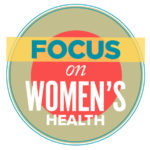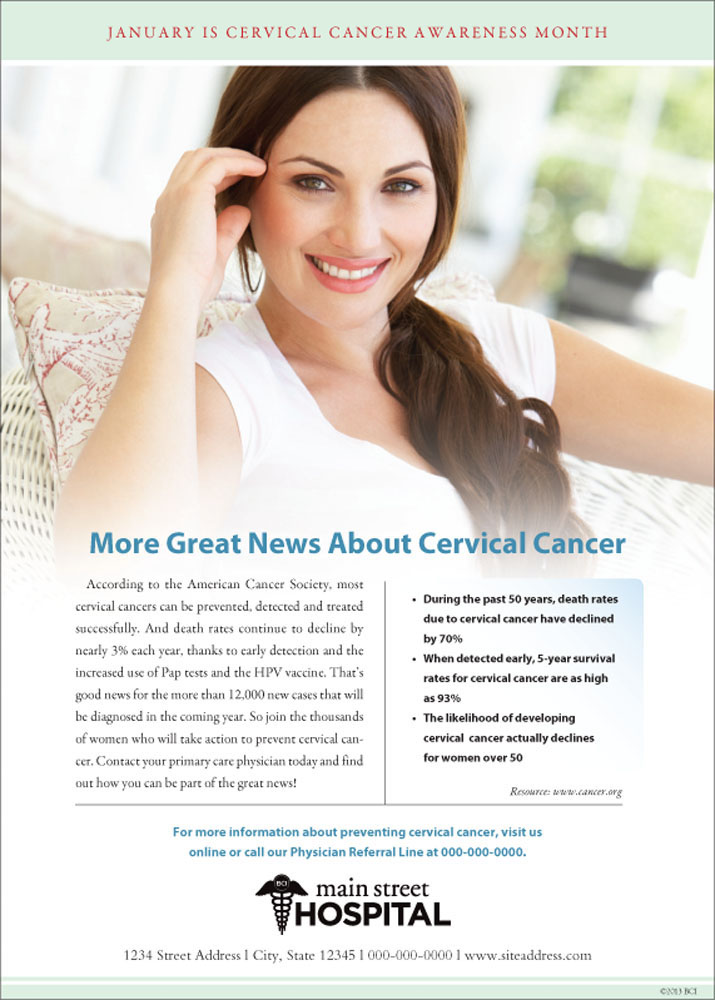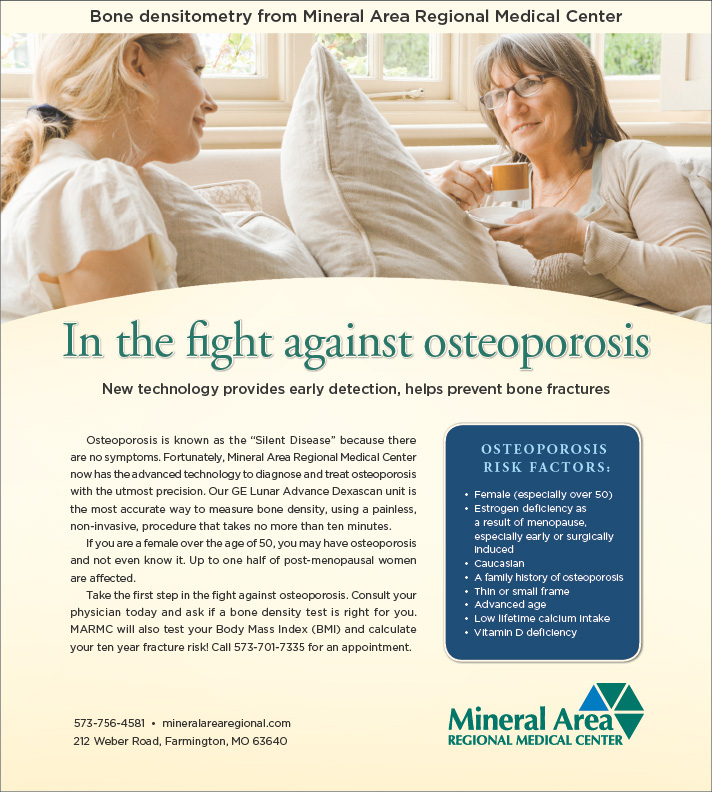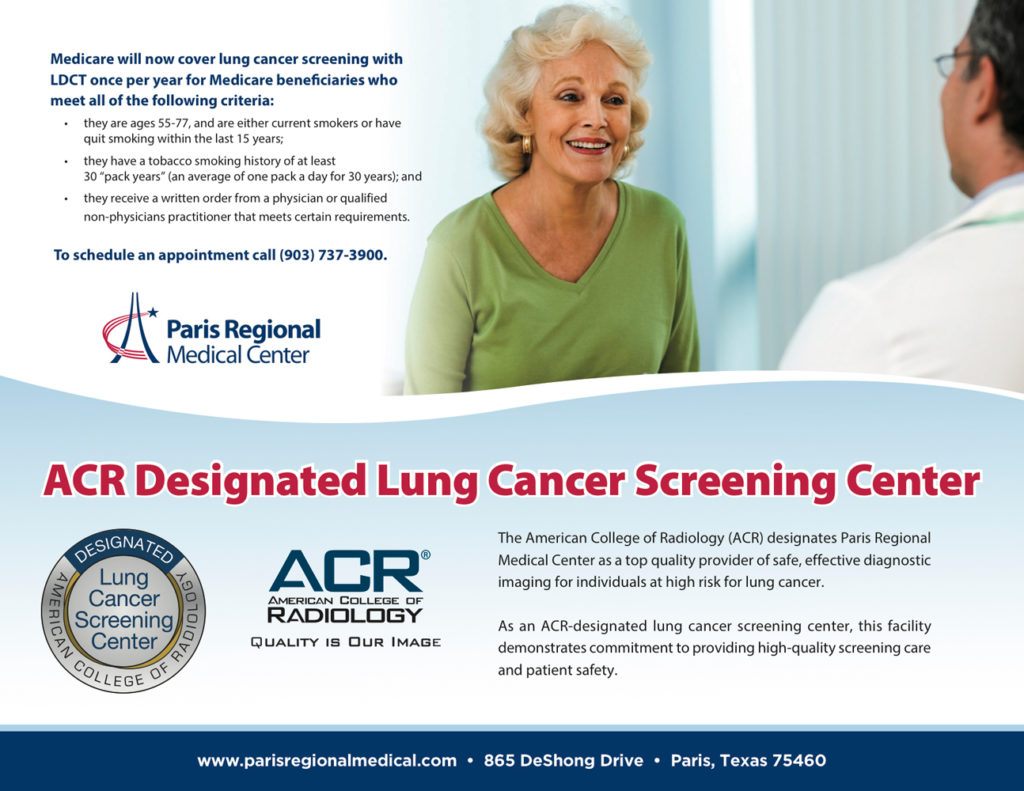
Nine Health Issues Every Woman Should Understand.
 Women often take the role of the caregiver in their families, but in many cases they neglect their own health and well-being while doing so. That’s why it’s important for all women to have a trusted resource they can turn to, a place with the knowledge and technology to provide the medical care they need with a high level of expertise and compassion. Your hospital and it’s network of clinics and healthcare providers can be that resource. Take a look at nine of the most common health issues that impact the lives of women and think about how your hospital or clinic can offer services to make sure women of all ages stay healthy!
Women often take the role of the caregiver in their families, but in many cases they neglect their own health and well-being while doing so. That’s why it’s important for all women to have a trusted resource they can turn to, a place with the knowledge and technology to provide the medical care they need with a high level of expertise and compassion. Your hospital and it’s network of clinics and healthcare providers can be that resource. Take a look at nine of the most common health issues that impact the lives of women and think about how your hospital or clinic can offer services to make sure women of all ages stay healthy!
1. Autoimmune Disease
Autoimmune diseases occur when a person’s immune system mistakenly attacks the tissues or organs it was designed to protect. Autoimmune disorders are more widespread than most people think, affecting at least 23.5 million Americans. About 75 percent of autoimmune diseases occur in women, leading the National Institute of Health to officially designate it as a major women’s health issue. There are more than 100 diseases caused by autoimmune responses. Four of the most common include lupus, multiple sclerosis (MS), rheumatoid arthritis (RA), and thyroid diseases such as Graves’ disease and Hashimoto’s thyroiditis.
2. Breast Cancer
One out of eight women will be diagnosed with the breast cancer in their lifetime. However, with early detection, treatment is highly successful, with a 98 percent five-year survival rate. A mammogram is the most effective screening tool for detecting breast cancer early before any symptoms appear. The American Cancer Society offers the following screening guidelines for women with an average risk for breast cancer. Women age 40 to 44 should have the choice to start screenings if they wish to do so. Women age 45 to 54 should have an annual mammogram, while women age 55 and older can continue with a yearly screening or switch to having a mammogram every two years. Screening should continue as long as the woman is in good health.
3. Cervical Cancer
Cervical cancer is the most common type of what are called the gynecological cancers (the others are ovarian, uterine, vaginal and vulva). Fortunately, it is also the easiest to detect with a simple Pap test. The main cause of cervical cancer is HPV (Human Papillomavirus). If you are between the ages of 21 and 65, talk to your primary care provider about when you need to have a Pap test and/or an HPV test.
4. Colorectal Cancer
Colorectal cancer is the third leading cause of cancer-death in the United States. Great progress has been made in recent years in fighting colorectal cancer. Screening tests, such as a colonoscopy, have the ability to remove pre-cancerous growths called polyps, which prevents the cancer from occurring. Unfortunately, about one in three American adults age 50 to 75 are not up to date with their colorectal screening. New guidelines now recommend that screening for colorectal cancer should start at age 45.
5. Depression
Depression affects more women than men. About 12 million women experience a depressive episode each year compared to about six million men. Risk factors for depression include hormonal changes (often associated with pregnancy or menopause), serious chronic illness, substance abuse, a stressful life event, early childhood abuse or a family history of depression.
6. Heart Disease
Heart disease is the #1 health concern for American women, responsible for about 20 percent of all female deaths in the United States. Although more men die of heart disease then women, women are often under-diagnosed. Women often experience a heart attack or stroke differently than men because their symptoms are sometimes much more subtle and therefore harder to detect. For example, instead of the crushing chest pain associated with heart attacks in men, women may just have a little bit of jaw pain, discomfort in the neck, shoulder and upper back, shortness of breath or nausea. Because these symptoms are less obvious, women may suffer more significant heart damage before they seek medical help.
7. Lung Diseases
Lung cancer kills more women than any other type of cancer. Although smoking is the leading cause of lung cancer, 20 percent of women who develop the disease have never smoked a cigarette. COPD (chronic obstructive pulmonary disease) is a common lung disease that makes it difficult to breathe. More than seven million American women suffer from COPD. Many more are undiagnosed or misdiagnosed with asthma. Symptoms include a cough, mucus production and wheezing.
8. Osteoporosis
Osteoporosis causes bones to become weak and brittle. More than 44 million Americans are at risk for osteoporosis, of which 68 percent are women. Fortunately, it’s never too late to keep your bones strong and avoid fractures. Having enough calcium and Vitamin D in your diet and engaging in bone-bearing exercises, such as lifting light weights, are two of the best ways to prevent osteoporosis. In addition to being female, other risk factors for osteoporosis include advanced age, family history, smoking, excessive alcohol use, estrogen loss or a sedentary lifestyle.
9. Skin Cancer
Skin cancer is the most common type of cancer, accounting for nearly half of all cancers in the United States. Melanoma is the most serious type of skin cancer, accounting for more than 75 percent of the skin-cancer deaths that occur each year. Unfortunately, women age 49 and younger have a higher probability of developing melanoma than any other cancer except breast and thyroid cancer.
Marketing Application
As the new year approaches, many people turn their thoughts to the long-standing tradition of making resolutions for the coming year. More often than not, health and wellness tops that list. In fact, according to a recent survey, the number one resolution in 2021 was “to focus on improving my health.” Living a healthier lifestyle starts with good information, and your hospital can serve as a source for that information. An effective marketing strategy might begin with the addition of an informative health and wellness presence on your hospital’s website, followed by marketing efforts that drive viewers to your site for information about how to schedule an appointment. Effective media should include social media, digital media and print, accompanied by a strong call to action to learn more by visiting your website.
About Brentwood Communications, Inc.
Brentwood Communications specializes in healthcare marketing. Through our monthly AdBank subscription service, thousands of field-tested marketing materials — including content related to end-of-year insurance deductibles — are available and can be easily customized to reflect your hospital or clinic’s existing brand.
Click here to discover more about AdBank and how Brentwood Communications specializes in providing marketing support for non-urban hospitals.
 Brentwood Communications also helps hospitals stay in touch with their communities through an informative and cost-effective digital and printed magazine called My Hometown Health, a powerful tool to help promote better health and raise awareness of key services available at the hospital. Emmy-nominated talk show host, choreographer and Dancing with the Stars judge Carrie Ann Inaba is featured in the current Fall 2021 magazine. Carrie Ann talks openly about her struggle with chronic autoimmune disease.
Brentwood Communications also helps hospitals stay in touch with their communities through an informative and cost-effective digital and printed magazine called My Hometown Health, a powerful tool to help promote better health and raise awareness of key services available at the hospital. Emmy-nominated talk show host, choreographer and Dancing with the Stars judge Carrie Ann Inaba is featured in the current Fall 2021 magazine. Carrie Ann talks openly about her struggle with chronic autoimmune disease.
Brentwood Communications makes creating and publishing a customized, local community health magazine easy and convenient. Click here to learn more, or contact us by email.






